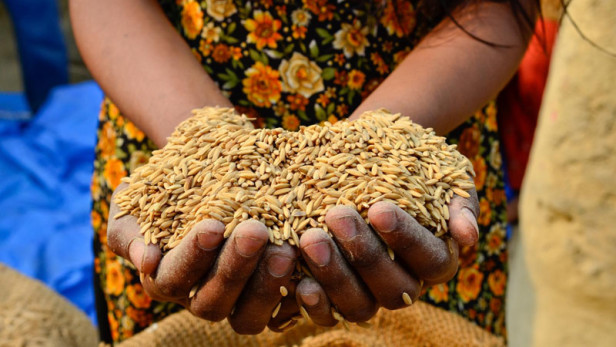EDITORIAL COMMENT: Food security guaranteed despite drought threat

All hope is not yet lost, but we are beginning to be concerned a little that the 2017/18 agricultural season might be poor.
Preliminary indications are that about 30 percent of crops planted since last year nationally has become a write off as the dry spell persists. It has not rained in many parts of the country since Boxing Day last year and temperatures are high. As a result, crops are wilting, 30 percent having reached permanent wilting stage, according to Cde Davis Marapira, the Deputy Minister of Lands, Agriculture and Rural Development.
To get a fuller picture of the situation in the fields, the Government is due to carry out its first national crop and livestock assessment exercise this season.
“The crop and livestock assessment is expected to reveal the area planted under different crops, the state of the crops and the hectarage affected by the dry spell. It will also reveal the state of livestock, availability of pastures and water,” said Cde Marapira.
“Farmers should continue to look after their crops and seek assistance from Agritex officials on the ground when carrying out agronomic practices such as fertiliser application,” he said.
In Mashonaland Central, the worst affected area is Rushinga, where 10 percent of the planted maize has reached permanent wilting stage.
Tobacco is also showing signs of false ripening due to the high temperatures in the province, although cotton is expectedly doing well. In Masvingo, hot temperatures have affected crops, with maize in Chivi, Zaka and Gutu districts reaching permanent wilting point. Even small grains are also showing signs of moisture stress in these areas.
Some farmers had planned to plant in January but have not been able to do so because of the dry weather conditions.
In drier Mwenezi and Chiredzi districts in the same province, farmers are, so early in the year, being urged to mobilise supplementary feeding for their livestock as the dry weather conditions are also affecting animals.
The situation is equally bad in Matabeleland region.
The prevailing dryness is largely in tune with an August 2017 prediction by weather experts, who in their forecast for the season, said the southern parts of the country would receive normal to below normal rains. However, their prediction that the northern parts of the country would receive normal to above normal rainfall may have been a miss.
Be that as it may, we remain optimistic that God will bless the country with more rains so that the little that farmers still have in their fields can recover, reach maturity and give the country a harvest.
This week started with some showers that looked promising around Bulawayo, and they appear to be picking up.
We continue to urge the Government to mobilise resources to put more land under irrigation as a drought mitigation strategy. Yes, we quoted Cde Marapira yesterday saying the irrigated crop is doing great, but it remains a small crop given that the country’s irrigation capacity is limited.
Climate change has shown us the dangers of relying on rains to grow crops, not only in our country, but also in most of Africa and beyond. The world is getting warmer and drier and when rains come, they tend to result in flooding.
Therefore, as a country we need to harness the water that falls in good seasons to ensure that farmers irrigate when bad seasons come as it appears to be the case this season. There is enough water in the scores of dams across the country, but that water remains largely untapped since we lack irrigation capacity. That must not happen for ever.
The Ministry of Lands, Agriculture and Rural Resettlement was allocated $52,1 million in the 2018 National Budget proposals for irrigation rehabilitation and development, targeting at least 200 hectares per district to be implemented annually over the next 10 years. This is a good gesture.
We expect command agriculture, which is anchored on farmers with irrigation capacity to help this year.
But amid what could develop into a bad agricultural year, the good news for all of us is that the strategic grain reserve is full thus a bad 2017/18 season will not result in hunger.
Also, the Zanu-PF Politburo was yesterday briefed by the Minister of Lands, Agriculture and Rural Resettlement Chief Air Marshal Perrance Shiri (Retired) that the national maize stockholding at the GMB is at 998 826 metric tonnes, against a national consumption of 150 000 per month.
“The country is currently food secure. Although the country has been gripped by some drought, irrigation equipment has been procured to alleviate the inadequate rainfall in order to increase crop productivity through provision of pivots, generators, transformers et cetera. Prolonged drought conditions are still a threat and plans are underway to counteract this problem. The report also covered the Presidential Input Support Scheme.
“The programme is supporting 1, 8 million households for maize and 400 000 households for cotton. A report was given on the rainfall situation, distribution, crop status, crop condition and the general irrigation development. The report also covered Command livestock, fisheries and wildlife, inclusive of (the) state of animal health, including foot and mouth and tick-borne disease. There was also a report given on environment, water and climate.”
Chief Air Marshal Shiri’s report will thus allay any fears that the possible drought would lead to hunger. However, we have to observe that the country’s overreliance on rain-fed production is a threat to long-term national food security. Irrigation, we reiterate, is the insurance against possible drought-induced food shortage












Comments